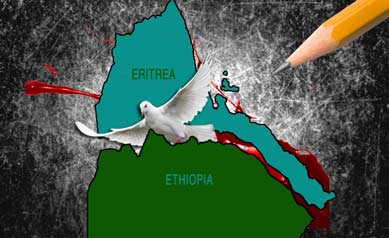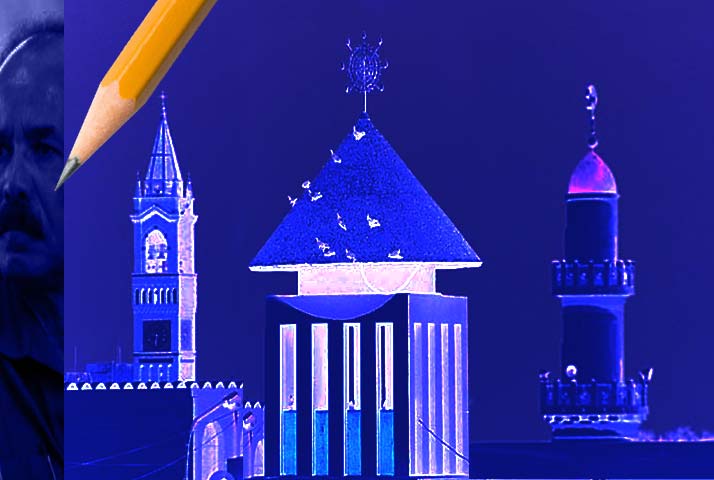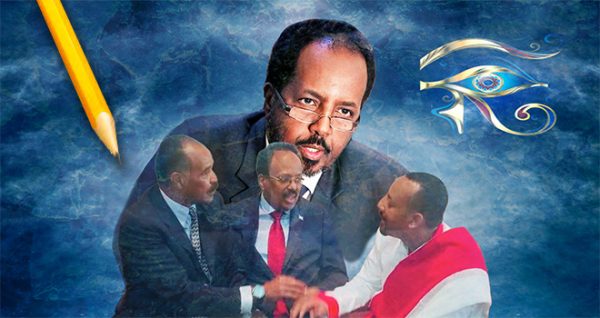A Glance To The Past, A Focus On The Future

Eritreans have a myriad of unresolved internal issues to worry about external ones. However, all of the problems and crisis hindering the creation of an effective opposition force to unseat the tyrant is not totally their fault. Frustration has been building among Eritreans who feel like they are adding water to a barrel with a hole in it.
Though the politically correct Eritreans would restrain themselves from criticizing Ethiopia, even mildly, the Awate Team has never stopped from mentioning the grievances that are causing frustrations among Eritreans. Ethiopian officials are infatuated with offering their patronage to select individuals, overtly and covertly, since the Eritrean opposition set shops in the country. At times, their choices have been political lepers at best, and unknown, untried individuals at worst. This editorial attempts to explain the fear of the unknown, the protection of national interest, and the aspiration of Eritreans in general. It hopes to shed light on the main issues that are behind all the murky and unproductive relations within the opposition, as well as the view of many Eritreans on the topic. Of course, this doesn’t diminish the humanitarian appreciated support that Ethiopia is offering to Eritrean refugees, and the educational opportunities that some young Eritreans are enjoying. However, today we will address only the sticky political issues–lacing it with gratitude and indebtedness to Ethiopia for its support will make it sound insincere.
Basic decency and prudent politics restrain governments from interfering in the business of other countries. Undoubtedly, human values also encourage people to be compassionate, friendly, and loyal to their neighbors. And the line that separates acceptable and detested interference is very thin. Hence, the need for diplomatic protocols that spell out articles that govern the relation between countries, since the cause of most conflicts is interference in the pursuit of national interests. However, sometimes countries may see the need to safeguard their national interest by pursuing an aggressive foreign policy which might have serious consequences. To avoid that, countries sign bilateral, trilateral, regional, and international agreements and treaties in order to regulate their relations and to minimize conflicts of interest.
Though both Sudan and Ethiopia have equal interest in Eritrea, and all of Saudi Arabia, Yemen and Djibouti are less interested in comparison, the Eritrean-Ethiopian relation is at the top of the foreign policy list of both countries. Understandably, that is due to the strong cultural and historical relations between the two countries. But, should that link annul the other Eritrean relations with other neighbors, as some believe and insinuate, or it should be given its due, fair, and balanced weight? The two major components of the Eritrean population are fearful of two hegemonic projects. The Muslims fear Abyssinian and Christian hegemony while the Christians fear the Muslim and Arab hegemony; the fear has now developed into a full blown crippling phobia bordering on sectarianism.
Given the fact that most of the historical conflicts in the region were fueled and ignited in the highlands of Eritrea and Northern Ethiopia, are the conflicts caused by rivalry and competition among kinfolks, as some describe it, or is it the fear of others that fuels the conflicts?
Unfortunately, the nature and gist of the conflicts in the region have remained the same: primordial allegiances and rationalization with feudal tendencies and characteristics. But such rifts are not new to Eritreans whose interests and social connections are deeper than meets the eye. Every time the rift showed its ugly face, the inner will of Eritreans has prevailed in defeating it. However, the 24-year old tyranny of Isaias Afwerki has denied Eritreans the opportunity to face such problems in a free environment, inside their country, by referring and falling back on their rich traditional conflict resolution mechanisms. Hence, open debates about national issues, including peace and coexistence, is entrusted to the exiled Eritreans who are trying their best to find solutions to their predicament. And since the Ethiopian-Eritrean relation is the main topic that occupies the mind of the average Eritrean and Ethiopian, relative to other relations, what happens in Ethiopia influences the Eritrean mindset; to a lesser extent, what happens in Eritrea concerns the average Ethiopian. Therefore, it’s our wish that Ethiopians see their Eritrean policy in this light because policies can either incite, provoke, or prevent conflicts that might lead to dire consequences.
As a major debating and opinion-making platform, awate.com has always been walking on a thin line to avoid trespassing on issues that many consider strictly external. However, the blurred thin line is so enticing to walk over. In addition, it’s difficult to discern whether certain issues are internal or external in nature. At any rate, what are the internal and external Eritrean concerns in regards to Ethiopian issues and vice versa?
Though Ethiopians and Eritreans went through a never-ending history of rivalry and violence, they have also seen occasional misleadingly calm years caused by mischievous alliances that are at the root of the instability in the region. In fact, the Abyssinian region played a major role in most of the conflicts of the region–it’s where oppression was unleashed, and where imperialism was expanded, with far-reaching adverse effects on the entire population of the two countries. A critical assessment is certainly a great social service for a stable future.
If we take the devastating border war of 1998-2000 between Eritrea and Ethiopia as a sample, we realize that seventeen years after the guns became silent and the war-cry was muffled, the aftermath of that conflict is still crippling the communities of the border areas–though the Eritrean side is suffering the most. Unfortunately, the role of the Eritrean opposition, that supposedly should alleviate the problem by ending the Isaias era of tyranny, is irrelevant.
The Eritrean opposition is a continuation of the pre-independence nationalist liberation struggle, but unfortunately, it is immersed in debilitating conflicts. Unfortunately, a sizable number of Eritreans believe Ethiopian officers handling the Eritrean opposition share a big chunk of the blame; another group absolves the Ethiopian officers of any damage on the opposition. Still others list a myriad of abstract causes to explain why the opposition is weak. At any rate, the Eritreans opposition finds itself marred by suspicions and conspiracy theories that are native to that specific region. Naturally, Ethiopians have similar views on the state of the Ethiopian opposition that Isaias has been nurturing and building. Therefore, it doesn’t hurt to address one problem at a time.
The Abyssinian influence on the opposition organizations of the two countries is evident–the elite does not see each other outside its primordial conflicts. The overwhelming number of the elite of the two sections of Abyssinia cannot see anything outside the Amharic-Tigrinya language spheres, and the Orthodox Christian prism. The rest of Eritreans and Ethiopians are always relegated to the role of fueling the mad and costly rivalry, dying in the endless wars that were imposed on them. At this moment, it seems as if the struggle to unseat Isaias is entrusted to the Eritrean highlanders and the rest are consciously absent and not interested in the ongoing conflicts. That doesn’t bode well for the unity of Eritrea.
The above historical realities still play an important role in shaping the current state of our region’s perceptions. However, it is suicidal to choose to live as a prisoner of the historical fallacies. The region needs to be forward-looking, it needs to chart a progressive, aggressive development strategy that would free the region from the historical bondage. That will surely help it tread towards peace, stability and development. But first, Eritreans need to clean their own house.
The following are a few critical issues that cry for resolution:
- Access To The Sea
.
The Eritrean shores are a major issue of contention among Ethiopians who still cannot perceive a “landlocked Ethiopia” while Eritrea sits on hundreds of miles of coastline. Ethiopia’s misguided desire for an access to the sea has greatly contributed to the six-decades history of bloody conflict between the two countries. To this day, some Ethiopian elite exaggerate and skillfully manipulate the issue of access to the sea as a tool for agitation. However, over the last seventeen years, Ethiopia has proved it can thrive without the use of Eritrean ports, while in the same time, Eritrea gained nothing from the ports. The idle ports should be the major concern of Eritreans; the few agitators from both sides should stop using the ports to fuel the conflicts that they think would enable them to seize power in Ethiopia and to keep it in Eritrea. Eritrea has lost huge revenues for seventeen years while its ports are idle. Its unenlightened government has denied the country thousands of jobs and development opportunities. While Eritreans carry the wound of the idle ports, Ethiopian agitators keep discussing the non-issue. To ignore the opportunities that availed themselves to Eritrean ports is an unforgivable sin, and the culprit is the Eritrean government. It foolishly lost sight because no sane business owner shuts the door to 90 million of his customers! Ethiopia should rest assured that post-Isaias Eritrea will not be as foolish, not because anyone can provide guarantees, but simply because it’s logical.
. - The Village Of Badme
.
Badme has been the cause of many small conflicts for over three-decades; in 1997 it became a flash-point for a major war where the two countries lost about 100,000 lives. The war created a colossal human crisis: hundreds of thousands of displaced villagers, uncountable homes shattered, and many families devastated. How much would one rationally pay for that desolate real-estate, depends on who is deciding. But certainly, a rational person knows it is not worth the cost. Yet, measured in ego value, it has no limit. Ego doesn’t quantify expenditure–that is what happened in paying for Badme, and the cost is still mounting to this day. Ethiopia seems hell bent on not relinquishing the village without a dialogue to fine tune the borders of the court decision; Eritrea seems hell bent on continuing to scream “Badme” regardless of the expected outcome. In the meantime, the small real-estate holds the livelihood of millions as a hostage. At this moment, any sane person would chose to resolve the issue after a normal situations prevail in the region.
. - A Volatile Neighborhood
.
The location of the region in question is in the most volatile spot; a region where fires are mysteriously ignited. Only fairness and equality among all of its citizens can shield the region from the raging fires. The absence of justice exposes the region to greater risks, and considering its surroundings, the risks are serious. ISIS, its affiliates, its clones, and predecessors are locking into the region, and so far the world seems to have failed in containing the savage onslaught and the raging fires. Evidently, the rise of the extreme form of Islamic terrorism has devastated Muslims many folds that of some other sects. The perpetrators of the crimes are Muslim fanatics, while their victims are overwhelmingly Muslims. Their countries are in ruins, their population is impoverished, displaced and scattered. A fringe group is wreaking havoc on the lives of the 1.6 billion Muslims worldwide. Sadly (and Ironically), some consider the victimized Muslims guilty by association. But the foolish victimization doesn’t do anything except corner the victims and thus push them closer towards extremism. Victimizing the victims is not only wrong and unjust, it cannot bring about a solution. On the contrary, empowering them to fight back yields results. Amateurish and hypocritical strategies will never solve the problem but make it worse. Every policy maker should recognize that pushing moderate Muslims to the corner is a recipe for disaster–the entire region needs to recognize this fact.
. - The Needed Changes
.
What are the mutually beneficial changes that both Ethiopia and Eritrea need?It is fair to say that the Ethiopian government realizes the huge historical luggage that it carries. So far, in general, the Ethiopian government has been handling the internal Muslim problems with satisfactory care and tact. However, the pristine Muslim tradition of the region does not need an impetus from Lebanon to preserve itself. Instead, it should be empowered to protect and sustain its traditions and structures. True, over the last few decades, an unpopular, aggressive, fundamentalist strain of Islam has been slipping into the social fabric of the entire Muslim population of the region. Such strains require a concerted resistance by all concerned, particularly the Muslims who should safeguard their communities from instability and mayhem. It cannot be resisted by a government fiat. The general demeaning and negative view towards Muslims in the region needs to undergo a massive transformation with education and awareness building. The paranoid need to heal themselves; hypocrites should be fought with determination. It’s inappropriate to treat Muslims as suspects in their own countries because of their faith. To illustrate this, let’s assume the Muslims of the region forged a serious national interest based alliance to fight their own problems and rid their communities of the fanatics–would it be accepted, just like the Ethiopian-Eritrea Christian relations, or it will be viewed suspiciously? Would the right of Muslims to do so, be questioned or welcomed?
. - The Eritrean Opposition In Ethiopia
.
The organized (rather, disorganized) Eritrean opposition forces have been in Ethiopia for as long as Eritrea was independent; their performance has been appalling. Though geography plays a role in the success of an opposition (and the ideal location is operating from inside Eritrea), the Eritrean opposition in Ethiopia does not have a tangible achievement that it can demonstrate. On the contrary, there is a negative influence on the Eritrean opposition; it’s pushed in many ways to adopt Ethiopian strategies that Eritreans didn’t initiate by themselves. Many wish Ethiopia to keep its distance from the entire inter-Eritrean opposition politics. So far, it has failed to do so; and the ENCDC, the last attempt to create a formidable opposition, is on its deathbed unless it’s saved by a miracle. Maybe the fear of the unknown scares the Ethiopian officials, but regardless, they have exacerbated the situation by engaging in overt and covert king making projects. That has weakened the growth and performance of the opposition forces that suffers from serious mistrust within itself, coupled with a meaningless power struggle and hegemonic projects at the expense of the supposedly main reason of its existence, which is to remove the oppressive regime in Eritrea. And by God, each day under Isaias, Eritrea is being pushed closer to the abyss.
The Awate Team hopes the above points will provoke serious debate and discussion among the stakeholders. Since these are sensitive issues, it is advisable that those with thin skin and intolerant characters stay away from such a debate.




Awate Forum